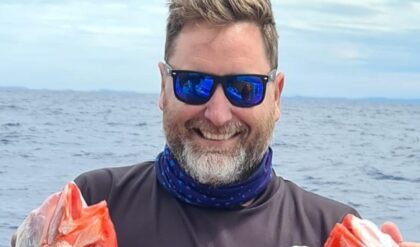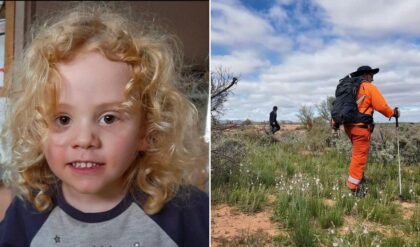Even among so many in the most colorful of Native regalia five years ago at the Indigenous Peoples March on the National Mall, I was drawn to Kali Reis, the first Native women’s boxing champion, as she awaited her turn to speak to a throng in front of the Lincoln Memorial along with American Indian activists such as Deb Haaland, not yet the secretary of the interior.
But it wasn’t just because of the bright red knit hat covering the equally bright red cloth wrapped around Reis’s forehead that chilly January day. Neither was it the red and black paint on her face, representing her people’s blood and their mourning. It was neither her cheek studs or septum ring nor the gold deer-hide ties around her braids nor the turquoise-beaded medallion dangling from her neck nor the camouflage jacket emblazoned with the word “Firekeeper.”
It was her eyes. Piercing. Framed by the sharp peak of her eyebrows. All of which conveyed an unmistakable self-possessed seriousness. As you would expect of a fighter climbing into the ring.
That look also captivated a couple of movie directors who paved her way to a much-celebrated acting performance next to Jodie Foster in HBO’s “True Detective: Night Country,” which concluded two Sundays ago. In her third acting gig, Reis was cast as Native mixed-race detective Evangeline Navarro. After the most-watched season in the series’ history, HBO announced Thursday the show was renewed for a fifth chapter.
“The first project that I had, ‘Catch the Fair One,’ the writer-director [Josef Kubota Wladyka] contacted me via Instagram,” Reis, 37, recounted to me last week over Zoom from her Philadelphia home. “He was like: ‘Hey, I’m so-and-so. Do you ever think about acting? I have this script.’ ”
She had never acted. On stage or in the ring, for that matter. She really is a badass, motorcycle-driving, onetime bouncer from the Seaconke Wampanoag tribe that calls Massachusetts and Rhode Island home. Between her boxing debut in 2008 and last fight in November 2021, she really did win three titles and 19 of her 27 bouts, including five by TKO, under a moniker including her Native name — Kali “KO” Mequinonoag Reis. And she did so while using her sport to sound the alarm about MMIW, missing and murdered Indigenous women, to whom we in the media and, by extension, the public have paid little to no attention.

Kali Reis defeated Jessica Camara in a 2021 title bout in Manchester, N.H. (Billie Weiss/Getty Images)
That was why Wladyka, who grew up in Falls Church, decided to contact Reis. As a boxing fan, he had seen her in HBO’s first match between women in May 2018, when Reis challenged then-undefeated world champion Cecilia Braekhus. Reis lost a unanimous decision but cemented her potential in the mind of Wladyka, who envisioned her in his script as a retired Native woman boxer looking for a missing sister. Who better than Reis, a boxer putting her spotlight on reports of more than 5,000 American Indian and Alaska Native women and girls who have disappeared, if she could pull it off?
“There are so many things that drew me to Kali,” Wladyka emailed me last week. “Here was this powerful, tough, World Champion boxer ready to fight the best in the world, but she had so much grace and composure in how she carried herself; it was really inspiring. I witnessed a raw honesty and vulnerability every time she faced the camera. As a filmmaker, I knew she had all the ingredients to deliver a strong performance, and since she was a professional athlete, I knew she had the discipline to put in the work to get there.”
All Reis did was win a jury award for her role as Kaylee in “Catch the Fair One” at one festival and get nominated at two others.
“I didn’t have any … actor training,” Reis said, “So [Wladyka] sent me to an acting coach by the name of Sheila Gray in New York. I call it an acting boot camp. I went to her for like a week, one-on-one, and I did a few improv classes. Other than that, that’s it.”
Then another director, Jean-Stéphane Sauvaire, saw Reis in Wladyka’s film. “As soon as he saw me on screen, he’s like, ‘Who is that?’ ” Reis recalled. And he cast her in “Asphalt City,” about the chaos of late-night New York City paramedics, starring Sean Penn with a cameo from Mike Tyson.
Reis isn’t the first boxer- or athlete-turned-actor, of course. She’s part of a long lineage. But I’m hard-pressed to recall one so wedded to a righteous reason for participating in her sport and her newfound craft. As Reis, who is also part Cape Verdean, addressed those gathered at the Indigenous Peoples March made infamous by the confrontation between MAGA-cap wearing boys from Covington (Ky.) Catholic High School, a native elder Nathan Phillips and Black Hebrew Israelites: “I fight for all [Native] nations … and when I say I fight for all nations, I fight for you, I fight for me, I fight for our ancestors. … I fight for the youth, the young people, who think there’s no hope, that resort to suicide, that resort to addiction, resort to all that … bad medicine because they think there’s no escape.
“I use my platform as being a fighter … because the time is now for our voices to be heard for all the injustices, for all the genocides. I fight in this ring for you. This is how I pray.”
Reis explained via Zoom: “That’s been the forefront since I found out that we had a tangible label [MMIW] to put [on] what we know that happens in our communities. It baffles me how many people still don’t know about it.”

Kali Reis, center, appeared with Jodie Foster and Aka Niviâna in the fourth season of “True Detective.” (Michele K. Short/HBO)
So she reminds of the issue to those who witness her. Every chance she gets. As in the fourth season of “True Detective,” located on Native land, dominated by Native women.
Spoiler alert!
Reis’s detective character and Foster’s investigate the murder of a Native activist from the Inupiat tribe, Annie Kowtok, at the Arctic Circle, with the deaths of several scientists at a research lab there. Navarro and Liz Danvers, Foster’s character, find out that the scientists murdered the activist after the activist uncovered their clandestine activity that was poisoning the Native land, supposedly for the betterment of mankind. And Navarro and Danvers discover that the scientists were killed by Native women who were avenging the threat to their land.
But no arrests are made. And near the end of the final episode, we see Reis’s character disappearing into the icescape. Another missing Indigenous woman. Reis doesn’t want you to forget them, and we shouldn’t.



